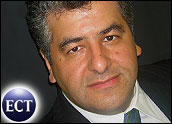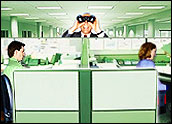
On April 27, President George Bush signed a copyright bill that aims to legalize technology that allows users to automatically skip over or mute objectionable content in movie DVDs.
Contained in DVD players and other devices, the filtering technology allows parents to prevent their children from seeing scenes involving sex, violence or foul language in movies. White House press secretary Scott McClellan said President Bush signed the bill privately and without comment.
The legislation, called the Family Entertainment and Copyright Act, was approved by the Senate in February of this year and by the House of Representatives last month.
Technology Versus Art
The legislation was drafted after Hollywood studios, the Director’s Guild of America and individual Hollywood directors filed a federal lawsuit in Denver to stop companies from manufacturing and distributing DVD players and other devices that contain the filtering technology.
The plaintiffs had argued that altering the content of the DVDs violates their copyrights. The defendant technology companies filed a motion for summary judgment, and a ruling by the U.S. District Court is pending.
The new statute would prevent similar lawsuits by creating an exemption to copyright laws for companies selling the DVD filtering technology.
Critics of the measure, such as Hollywood studios, claim that the exemption is specifically for the benefit of ClearPlay, a company that sells filtering software for DVD players and plans to integrate its technology into additional devices. These critics argue that ClearPlay should pay the creators of the DVDs licensing fees for altering their movies. ClearPlay’s response is that the law is a positive step for parents and for the technology sector, enabling people to watch movies in the manner they wish in their own homes.
Despite the exemption this law provides, which appears to favor technology companies over the creators of artistic works, the statute at the same time contains measures intended to crack down on people using technology to profit by infringing the rights of copyright owners. Although the law permits companies to sell technology that people can use to edit out objectionable material from DVDs, it explicitly provides no legal protection to companies that produce edited copies of DVDs and sell them directly to the public.
Additional Targets
The law also creates criminal penalties for people caught using recording devices to make unauthorized copies of first-run films in movies theaters. Furthermore, it increases the penalties for those who distribute songs or movies before they are released commercially.
Also included in the statute is a reauthorization of a Library of Congress program, which saves rare, culturally significant works unlikely to be preserved by major studios, such as silent-era films, for the purpose of research and educational availability.
A provision allowing the attorney general to bring lawsuits against copyright infringers was removed from an earlier version of the legislation. Another provision imposing criminal penalties for file sharers also was removed. The earlier version went as far as lowering the standard for copyright infringement by removing the willfulness element in the definition of copyright infringement, thereby potentially catching as criminals file sharers who merely had a number of songs on their computer but did not intend to make their files public.
Despite the criticism levied against this legislation by the entertainment industry, it is still unclear whether the law will have a significant impact on the existing balance between copyright owners and users of copyrighted material such as movies.
Javad Heydary, an E-Commerce Times columnist, is a Toronto lawyer licensed to practice in both Ontario and New York and is the managing editor of Lawsof.com.





















































Social Media
See all Social Media